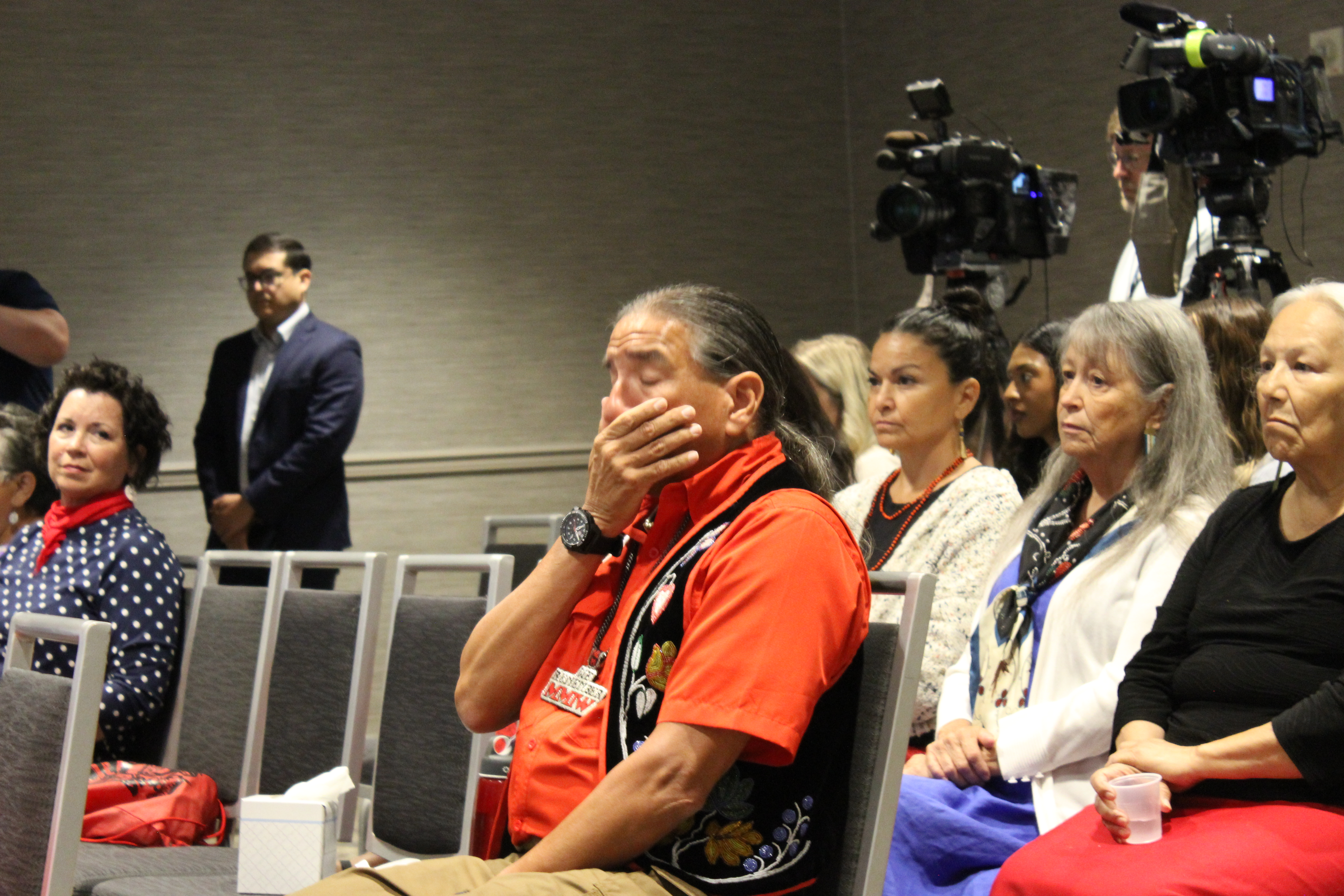
- Details
- By Native News Online Staff
Thirteen Democratic lawmakers are calling on the U.S. Department of Justice (DOJ) to reinstate the Not Invisible Act Commission Report on its website. The report, which contained vital findings and recommendations regarding the Missing and Murdered Indigenous Persons (MMIP) crisis, was unexpectedly removed following the implementation of a recent executive order—effectively erasing years of essential research and community testimony.
Representatives Sharice Davids (D-KS), whos is tribal citizen of the Ho Chunk Nation, and Gwen Moore (D-WI) led a group of their colleagues in this effort.
The Not Invisible Act Commission Report was taken down in response to an executive order signed by President Donald Trump, which mandated the elimination of all federal government policies and initiatives related to diversity, equity, inclusion, and accessibility (DEIA).
In their letter to the DOJ, the Members underscored the significance of the report, stating:
“The Not Invisible Act Commission was composed of Tribal leaders, law enforcement, federal partners, service providers, and survivors, all of whom contributed to meaningful recommendations for the DOJ and Department of the Interior (DOI) on how to address violence against American Indians and Alaska Natives. The Commission conducted seven in-person field hearings and one multi-day virtual national hearing, gathering input from over 260 individuals. Many were survivors or family members of victims. Their lived experiences were foundational to the report’s recommendations and are critical to understanding and responding to the MMIP crisis. This landmark report reflects months of rigorous data collection and testimony from across the country.”
The Members also expressed deep concern over the report’s removal on February 18, 2025. The 212-page document, titled Not One More, was taken down in response to President Trump’s executive order, Defending Women from Gender Ideology Extremism and Restoring Biological Truth to the Federal Government (“Defending Women”). The lawmakers emphasized that the work of the Not Invisible Act Commission does not promote gender ideology or extremism and is fully compliant with the relevant sections of the Office of Personnel Management (OPM) memo addressing the order.
They further stressed the report’s importance, particularly given the disproportionate rates of violence experienced by Indigenous people—especially women—and the ongoing underreporting of MMIP cases.
“Indigenous people experience some of the highest rates of violence in the United States. According to the DOJ’s National Institute of Justice, 84.3% of Native women and 81.6% of Native men have experienced violence in their lifetime. Yet systemic issues—such as racial misclassification and strained relationships between tribal governments and outside law enforcement—continue to hinder accurate data collection and reporting of MMIP cases.”
The Members concluded their letter with a firm call to action:
“We urge the DOJ to immediately restore public access to the Not Invisible Act Commission Report. Its removal obstructs the path to long-overdue justice and undermines efforts to confront and resolve the MMIP crisis. Publicly accessible data is critical—it helps identify patterns of disappearance and death, informs community and law enforcement responses, and guides policymaking. Without this report, we lose one of our most powerful tools in the pursuit of justice.”
More Stories Like This
Native News Weekly (August 25, 2024): D.C. BriefsUS Presidents in Their Own Words Concerning American Indians
Indigenous Actor Elaine Miles Reports Detention by Alleged ICE Agents
Happy Thanksgiving from Native News Online
Coming Up on Native Bidaské: Behind the Animation: Joey Clift Talks “Pow” and Native Storytelling
Help us tell the stories that could save Native languages and food traditions
At a critical moment for Indian Country, Native News Online is embarking on our most ambitious reporting project yet: "Cultivating Culture," a three-year investigation into two forces shaping Native community survival—food sovereignty and language revitalization.
The devastating impact of COVID-19 accelerated the loss of Native elders and with them, irreplaceable cultural knowledge. Yet across tribal communities, innovative leaders are fighting back, reclaiming traditional food systems and breathing new life into Native languages. These aren't just cultural preservation efforts—they're powerful pathways to community health, healing, and resilience.
Our dedicated reporting team will spend three years documenting these stories through on-the-ground reporting in 18 tribal communities, producing over 200 in-depth stories, 18 podcast episodes, and multimedia content that amplifies Indigenous voices. We'll show policymakers, funders, and allies how cultural restoration directly impacts physical and mental wellness while celebrating successful models of sovereignty and self-determination.
This isn't corporate media parachuting into Indian Country for a quick story. This is sustained, relationship-based journalism by Native reporters who understand these communities. It's "Warrior Journalism"—fearless reporting that serves the 5.5 million readers who depend on us for news that mainstream media often ignores.
We need your help right now. While we've secured partial funding, we're still $450,000 short of our three-year budget. Our immediate goal is $25,000 this month to keep this critical work moving forward—funding reporter salaries, travel to remote communities, photography, and the deep reporting these stories deserve.
Every dollar directly supports Indigenous journalists telling Indigenous stories. Whether it's $5 or $50, your contribution ensures these vital narratives of resilience, innovation, and hope don't disappear into silence.
 The stakes couldn't be higher. Native languages are being lost at an alarming rate. Food insecurity plagues many tribal communities. But solutions are emerging, and these stories need to be told.
The stakes couldn't be higher. Native languages are being lost at an alarming rate. Food insecurity plagues many tribal communities. But solutions are emerging, and these stories need to be told.
Support independent Native journalism. Fund the stories that matter.
Levi Rickert (Potawatomi), Editor & Publisher

